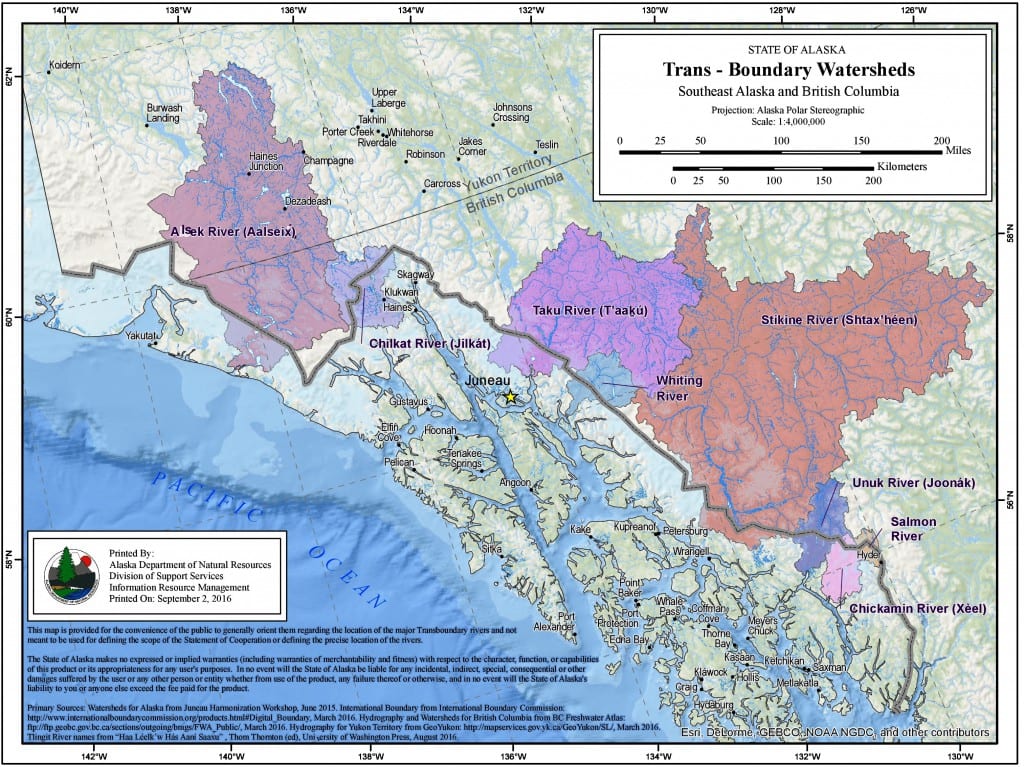
Eight transboundary watersheds feed Southeast Alaska rivers. A coalition of tribal governments is pushing the federal government to protect their fisheries. (Map by Alaska Department of Natural Resources.)
Could a cross-boundary mining battle lead to a trade war with Canada? A Southeast Alaska tribal organization is using that possibility to push federal officials into providing stronger protections for regional fisheries.
A coalition of 16 Southeast tribal governments has filed paperwork that could lead to trade sanctions against British Columbia, which borders the region.
Frederick Olsen Jr. is chairman of the Southeast Alaska Indigenous Transboundary Commission. He said about half of the region’s tribal governments have signed a petition to the federal Department of the Interior.
“The goal is to get federal involvement in our transboundary mining issue. And so we are getting some more of our member tribes to sign on,” he said.
What’s called a Pelly Petition is allowed under a provision of the federal Fishermen’s Protective Act.
Guy Archibald is staff scientist for the Southeast Alaska Conservation Council, which also opposes transboundary mining.
“If another country is found to be violating the tenets of the Fisherman’s Act, the other country can institute trade sanctions against that country,” he said.

Frederick Olsen Jr. is chairman of the Southeast Alaska Indigenous Transboundary Commission. (Photo courtesy SAITC)
A number of advocacy groups and local governments are concerned about mines on or near British Columbia rivers that flow through Southeast. They said silt, minerals and acidic water from the mines will damage fish stocks on both sides of the border.
British Columbia’s mineral-extraction industry said it develops and operates its mines safely, with limited environmental impacts. But it’s had to defend itself after the Mount Polley Mine tailings dam collapse.
Archibald said trade sanctions are not the petition’s real goal.
Instead, the groups want federal officials to put their concerns before the International Joint Commission. That panel moderates disputes involving U.S.-Canada boundary waters.
“Now, nobody really wants to start a trade war with British Columbia. Basically, what they’re saying, is that if neither country wants to refer this matter to the International Joint Commission, we as the people on this side have another options. And that maybe the International Joint Commission would be the less onerous of the two options,” he said.
Interior Department officials did not immediately respond to inquiries about the petition. Archibald said they’ve told petitioners they’re looking into it, but that’s all.
Earlier efforts trying to get the State Department to involve the joint commission were unsuccessful.
The Southeast Alaska Indigenous Transboundary Commission is the new name for the United Tribal Transboundary Mining Work Group.
Olsen, the chairman and a Kasaan resident, said the new name addresses the wider scope of the group’s work.

Tis Peterman is coodinator of the Southeast Alaska Indigenous Transboundary Commission, formerly the United Tribal Transboundary Mining Work Group. (Photo by KSTK-FM)
“Transboundary issues are far beyond mining alone. There’s oil tankers, there’s radioactive debris, there’s fish farms breaking apart, there’s cruise ships dumping their bad water,” he said.
Another change: The nonprofit organization hired its first employee in August.
Wrangell resident and activist Tis Peterman is the new coordinator.
“We’ve never had a staff person. And so trying to get everybody coordinated and meeting and coordinating meetings with First Nations in B.C. is one of my tasks,” she said.
The organization is also reaching out to Alaska Native groups facing similar issues. Olsen said that includes the United Tribes of Bristol Bay.
“We completely back them up in their fight against the Pebble Mine and to protect Bristol Bay and all the watersheds up there,” he said.
He said hiring a coordinator will help develop and formalize such relationships.





